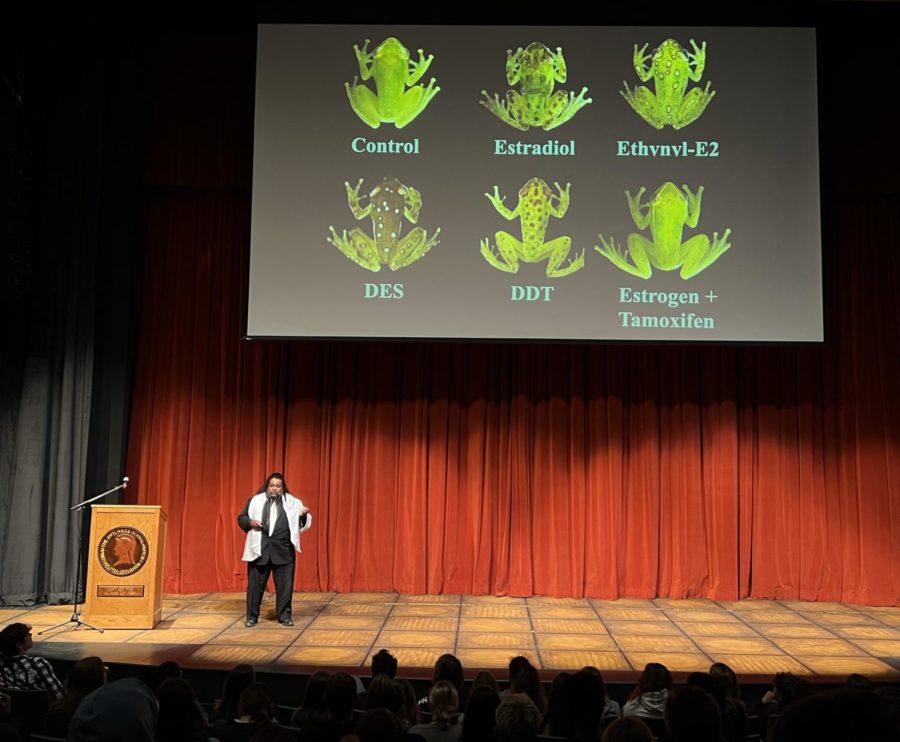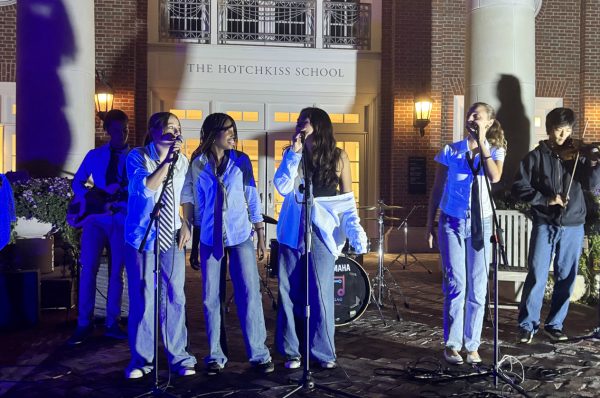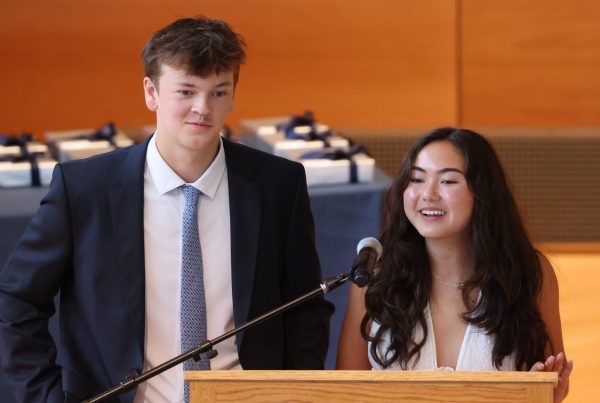Dr. Tyrone Hayes Commences Reinstatement of Beal Lecture Series
Dr. Tyrone Hayes addresses the community during the annual Beal Lecture.
The Beal Lecture series returned to campus for the first time in three years on April 28, renewing a school tradition that dates back almost 40 years.
Dr. Tyrone Hayes, an endocrinologist at the University of California Berkeley, delivered the lecture to a packed Walker Auditorium, touching on concepts of endocrine disruption, environmental justice, and accessibility of scientific research.
Mr. John Shedd Reed ’35, who sat on the school’s Board of Trustees, established the Beal Lecture Series in 1983 to honor his friend, Mr. Thaddeus “Ted” Beal ’35. Mr. Beal was the stepson of former Head of School Mr. George Van Santvoord.
The Beal Lecture series — which was created to bring the outside world to the school by focusing on current global issues — was held annually since 1983 until the pandemic hit.
Past lectures have encompassed a diverse range of disciplinary topics, ranging from Middle-Eastern geopolitics to women’s rights in America. Speakers invited in recent years have included Nicholas Burns, former ambassador of the North Atlantic Treaty Organization (NATO), and Gloria Steinem, an American feminist journalist and sociopolitical activist. This year, the community welcomed Dr. Hayes to give a presentation on his extensive work with frogs.
Born in Columbia, South Carolina, Dr. Hayes repeatedly cited his experiences in his hometown as the inspiration behind his esteemed career, saying he’s always been “just a boy who likes frogs.”
As a child, Hayes was an ardent collector of tadpoles and frogs, fascinated by the swamp next to his childhood home. He left South Carolina for college, earning his B.A. and M.A. degrees in biology from Harvard University.
After graduating, Dr. Hayes became a postdoctoral fellow at the University of California Berkeley, where he obtained full professorship in 2003. Hayes has won multiple awards for his teaching and groundbreaking research, such as the Distinguished Teaching Award from the University of California, Berkeley in 2002, the President’s Citation Award from the American Institute of Biological Science in 2004, and the National Geographic Emerging Explorer Award and the Jennifer Altman Award in 2005.
Besides sharing his biological research, Dr. Hayes’s lecture on frogs extended to matters of diversity, equity, and inclusion: He examined the correlation between environmental racism and atrazine exposure, demonstrating the environmental and socio-cultural effects of the chemical. Since going public with his research, Dr. Hayes has become an outspoken advocate of banning atrazine, illustrating connections between low-wage work and exposure to agricultural chemicals.
Mr. Keith Moon, instructor in English, history, and Russian language, has been in charge of the process of selecting and inviting the speakers for the Beal Lecture Series for the past 25 years. He considers a variety of factors when considering who to invite for each year’s lecture.
“I try my best to pay a lot of attention to the things that have been going on at school and things that have been going on in the world,” he said, “ and try to use a network of people I know to try to find a speaker that would really energize the student body.”
Many students on campus had not attended a Beal Lecture until this year due to the pandemic and expressed excitement about the series’s return.
“[The talk] was very informative and fun,” said Kiera Cason ’24. “I learned a lot of things that I haven’t known before, like the downsides of atrazine and its huge consequential effects. I can’t wait for the ones in the next few years.”





